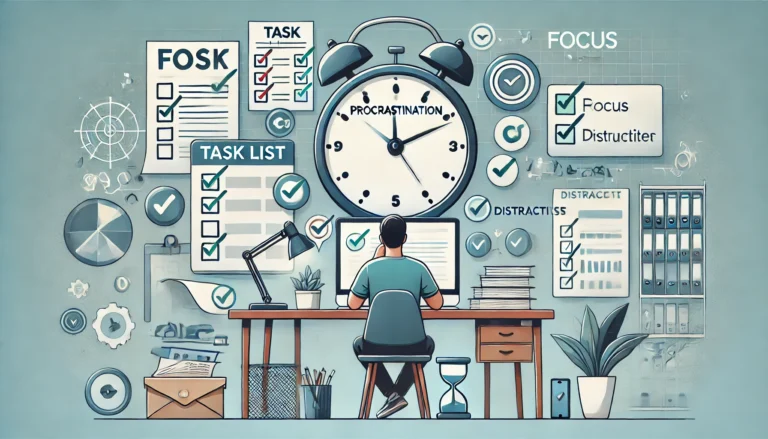Productivity Tips to Improve Your Daily Routine
Keeping productivity high in your daily life can be a significant challenge, especially with so many distractions around. However, with a few simple strategies, you can optimize your routine and make your daily tasks more efficient and less exhausting. If you’re looking for productivity tips to improve your daily routine, this article will provide valuable insights to help you maximize your time and energy.
1. Plan Your Day the Night Before
One of the best productivity tips is to start your day… the night before. Before going to bed, take 10 to 15 minutes to plan the tasks for the next day. This simple habit helps reduce the time you’d spend in the morning trying to get organized and gives you a clear sense of what needs to be done. Use a to-do list, a productivity app, or even a simple notebook.
Prioritize the most important tasks (also known as MITs – Most Important Tasks) and allocate time for each of them. This pre-planning minimizes procrastination and ensures you start your day with a clear purpose.
2. Apply the Pomodoro Technique
The Pomodoro technique is an excellent tool to boost productivity and maintain focus. It consists of working in 25-minute blocks, known as “Pomodoros,” followed by a 5-minute break. After four Pomodoros, you take a longer break of 15 to 30 minutes. This method encourages intense focus on specific tasks without interruptions, which can be particularly useful for avoiding distractions and improving concentration.
To apply it effectively, set a timer for each cycle and make sure to stick to the breaks. The short pause helps recharge your energy, keeping your mind active and productive for longer.
3. Set Clear and Realistic Goals
Having clear goals is essential to staying productive. Vague or unrealistic goals can lead to frustration and demotivation. Therefore, it is important that your daily and weekly goals are SMART, meaning: Specific, Measurable, Achievable, Relevant, and Time-bound.
For example, instead of setting “exercise” as a goal, try being more specific, such as “run for 30 minutes at 7 a.m.” The more detailed your goals are, the easier it will be to follow and track them over time.
4. Eliminate Distractions
Distractions are major enemies of productivity. To ensure that you stay focused on your tasks, it’s essential to identify and eliminate the main sources of distraction. This might include turning off phone notifications, limiting the use of social media during work hours, or creating a workspace free of elements that might divert your attention.
If you work from home, talk to your family or roommates to ensure they respect your work time, avoiding unnecessary interruptions. Also, use tools like website blockers or apps that monitor the time spent on digital activities, helping to avoid procrastination.
5. Use the 2-Minute Rule
The 2-Minute Rule is simple: if a task can be done in two minutes or less, do it immediately. This technique was popularized by David Allen, author of Getting Things Done, and aims to reduce the number of small tasks that accumulate throughout the day and end up consuming unnecessary time.
By applying this rule, you avoid procrastinating on simple tasks and keep your workflow moving. Additionally, you’ll feel lighter by quickly eliminating small pending items.
6. Practice Mindfulness
Mindfulness can be a great ally of productivity. Staying present and focused on the current moment, rather than letting your thoughts wander between past concerns or future worries, can significantly improve the quality of your work.
Incorporating small mindfulness practices throughout the day, like taking deep breaths for a few minutes or making conscious breaks, can help you stay calm and focused, even on more chaotic days. Additionally, it reduces stress, promoting a sense of well-being that positively impacts your productivity.
7. Sleep Well and Take Care of Your Health
Productivity is closely linked to your physical and mental health. Poor sleep, an unhealthy diet, or neglecting exercise directly affects your ability to concentrate and perform daily tasks. Therefore, having a good sleep routine, eating a balanced diet, and exercising regularly are essential factors for maintaining energy and focus throughout the day.
Studies show that sleep deprivation can drastically reduce productivity and increase stress levels. Aim for 7 to 9 hours of sleep per night and create a rest routine that works best for your body.
8. Review Your Progress at the End of the Day
At the end of each day, it’s important to review the tasks you accomplished. This reflection not only provides a sense of achievement but also helps identify what worked and what needs adjustment. Perform a self-assessment: “Did I meet my goals? What prevented me from being more productive today?” This daily analysis is crucial for adjusting your routine and continually improving.
Conclusion
Daily productivity is the result of small choices and habits accumulated over time. Incorporating the tips above into your routine can bring significant improvements in your performance and quality of life. From planning your day the night before to practicing mindfulness and taking care of your health, these are the practices that make a difference. By applying these productivity tips, you’ll create a more efficient and balanced routine, allowing you to better manage your time and achieve your goals more easily.
Remember, the key is consistency. You don’t have to change everything at once. Choose one or two tips to start with and gradually adjust your routine.







